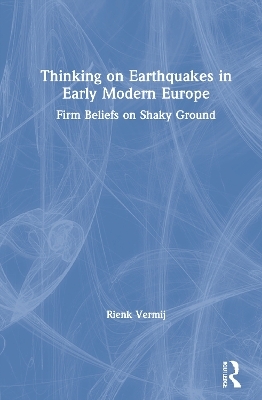
Thinking on Earthquakes in Early Modern Europe
Routledge (Verlag)
978-0-367-49219-9 (ISBN)
This book is the first extensive study of ideas on earthquakes before the Lisbon earthquake in 1755. The earthquake had a deep impact on European culture, and the reactions to it stood in a long tradition that, before this study, had yet to be explored in detail.
Thinking on Earthquakes investigates both scholarly theories and views that were propagated among the early modern European population. Through a chronological approach, Vermij reveals that in contrast to the Ancient and medieval philosophers who suggested rational explanations for earthquakes, supernatural ideas made a powerful comeback in the sixteenth century. By analysing a variety of sources such as pamphlets, sermons, and treatises, this study shows how changes in the ideas on earthquakes were a result of social and political demands as well as from improvements in the means of communication, rather than from scientific methods. Thus, Vermij presents an illuminating case for the production of knowledge in early modern Europe.
A range of events are explored, including the Ferrara earthquake in 1570 and the Vienna earthquake in 1590, making this study an invaluable source for students and scholars of the history of science and the history of ideas in early modern Europe.
Rienk Vermij obtained his PhD in 1991 at Utrecht University, the Netherlands, and is presently Professor at the Department of History of Science of the University of Oklahoma. He has published on several aspects of early modern intellectual culture. Among his books is The Calvinist Copernicans. The Reception of the New Astronomy in the Dutch Repbublic 1575–1750 (2002).
Part I: Scientific, philosophical, and religious traditions up to the Renaissance 1. Experiencing earthquakes 2. Reading on earthquakes: explanations and interpretations up to the end of the Renaissance 3. Writing on earthquakes: the available information 4. Earthquakes in Renaissance scholarship Part II: Early modern confessionalized science 5. The assault on naturalism 6. The emergence of a science of signs 7. Prodigies in Reformation scholarship 8. Miracles and meteorology among Catholic scholars 9. Reactions to earthquakes in the sixteenth century: the emergence of a discourse 10. Interpreting earthquakes in the seventeenth century 11. Marginalized approaches Part III: The rise of modern empiricism 12. New sources of information and the rise of a scientific public 13. New observations and theories: the non-confessional investigation of nature 14. Confessionalized natural philosophy in the age of the new sciences 15. Earthquakes in the religious discourse of the late seventeenth century
| Erscheinungsdatum | 20.11.2020 |
|---|---|
| Verlagsort | London |
| Sprache | englisch |
| Maße | 156 x 234 mm |
| Gewicht | 453 g |
| Themenwelt | Geschichte ► Allgemeine Geschichte ► Neuzeit (bis 1918) |
| Geisteswissenschaften ► Geschichte ► Regional- / Ländergeschichte | |
| Geisteswissenschaften ► Philosophie ► Philosophie des Mittelalters | |
| Naturwissenschaften | |
| ISBN-10 | 0-367-49219-9 / 0367492199 |
| ISBN-13 | 978-0-367-49219-9 / 9780367492199 |
| Zustand | Neuware |
| Haben Sie eine Frage zum Produkt? |
aus dem Bereich


